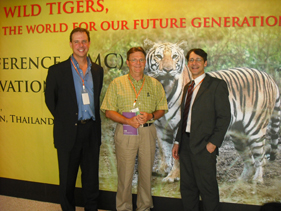Tigers – Top of the food chain, but facing extinction.
Tuesday, 30 Jan, 2010
0

Keith Sproule (WWF Namibia & member of the STI Board) Steve Noakes (Pacific Asia Tourism Pty Ltd and STI Advisory Committee member) & Richard Damania, Lead Environmental Economist of The World Bank’s South Asia Sustainable Development Department, talking ecotourism & wildlife conservation at the recent high level Ministerial Tiger Conservation meeting in Thailand
It’s 2010, the Year of the Tiger, BUT, time is running out to conserve the wild tigers of Asia
100 years ago, 100,00 tigers lived in habitats across Asia. Now, only about 3,000 of these magnificent animals survive. They have lost 40% of their remaining habitat in the past 10 years alone. The first Asia Ministerial Conference on Tiger Conservation was held at Hua Hin, Thailand.
The conference was attended by Ministers and senior officials from the 13 Tiger Range Countries (TRC) – Bangladesh, Bhutan, Cambodia, China, Indonesia, Lao PDR, Malaysia, Myanmar, Nepal, Russia, Thailand & Vietnam. Each country is a member of the Global Tiger Initiative, supported by numerous stakeholders, including The World Bank, Smithsonian Institution, WWF, Wildlife Conservation Society, Conservation International and Save the Tiger Fund
Ecosystems, endangered species, biodiversity and loss of habitats are inextricably linked with the livelihoods of the poor.
‘There will be no room left for tigers and other wildlife in Asia without a more responsible and sustainable program for economic growth and infrastructure development’ The tiger may be only one species, but the tiger’s plight highlights the biodiversity crisis in Asia’. said Robert Zoellick, President, The World Bank Group.
STI Board member, Keith Sproule (currently with WWF Namibia) and STI Advisory Board member, Steve Noakes (Pacific Asia Tourism Pty Ltd & Ecolodges Indonesia) were invited by the World Bank to provide examples from their own experiences contributing to biodiversity conservation and community benefits from wildlife tourism.
Keith and Steve introduced the delegates to contemporary case studies on ecotourism and wildlife conservation they are respectfully engaged in Namibia and Indonesia. While ecotourism is not a panacea for tiger conservation, it was generally agreed by delegates that properly planned and well managed, it should be one of the more beneficial tools to be applied.
Keith’s presentation was a case study of efforts undertaken in Namibia to provide incentives for local communities to live with wildlife, including predators. The relevance of a Namibian case study is that the types of incentives in use may prove applicable for Tiger Range States.
The three core messages of this presentation include:
- Devolution of Rights over Wildlife and Tourism to Communities
- The parallel successes of Tourism Joint-Ventures (JV’s) and Wildlife Recovery
- Impact at the Destination-Level
‘The devolution of rights over wildlife and tourism to local communities has created the “greatest African wildlife recovery story ever told” – and predators are an integral part of the story.’ Keith Sproule
Steve Noakes cited the experiences of Ecolodges Indonesia and the challenges facing the wild tiger habitat within Way Kambas National Park which have been identified by the local National parks staff, including:
- Protection flora-fauna & ecosystem of the Park – illegal poaching, illegal logging
- Forest fire, encroachment, livestock invasion, etc.
- Law enforcement – effectiveness of coordination with local Government law agencies
- Human – elephant conflict mitigation: improvement strategy and facilities
- Area rehabilitation and reforestation of ex-forest fire, ex-settlement (deadly wells), ex-encroachment, etc.
- Building biodiversity research and database – information system, to develop more effective conservation strategy
- Community development and participation/involvement through improve education & awareness programs.
The ‘bottom-line’ of his presentation was ‘Tourism not a panacea for wildlife conservation, poverty reduction & related MDG targets. But it can play an important part. It needs workable partnerships – government, private sector, community, conservation and development sectors. ‘
Valere Tjolle
Full Suite of 4 2010 Sustainable Tourism Reports will be available shortly For anyone interested in sustainable tourism these are must-have reports. They will: Inform your planning * Inform your investing * Inform your colleagues * Maximise your ROI * Help you create winning sustainable strategies
Valere
Have your say Cancel reply
Most Read
TRAINING & COMPETITION
 United Kingdom
United Kingdom United States
United States Asia Pacific
Asia Pacific












































BA suspending all Heathrow to Abu Dhabi flights
Turkish Airlines flight in emergency landing after pilot dies
Unexpected wave rocks cruise ship
Woman dies after going overboard in English Channel
Foreign Office issues travel advisory for winter sun destinations